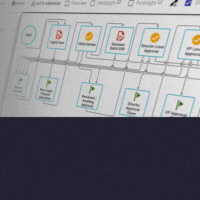Why the construction industry needs workflow automation
Table of contents

By implementing workflow automation, construction teams can benefit from improved communication, greater project visibility, improved data accuracy, increased productivity, and enhanced compliance and risk management.
Construction is one of the most complex and demanding industries, with myriad stakeholders involved in each project. The processes require collaboration and communication from architects, engineers, contractors, subcontractors, suppliers, and clients. The traditional paper-based approach to managing construction workflows is inefficient, time-consuming, and can lead to errors, which, given the capital-intensive nature of projects, can have serious consequences. However, the construction industry can streamline its processes and improve productivity with workflow automation. Here are five reasons why construction organizations need to implement workflow automation.
1. Streamline communication and collaboration.
Workflow automation tools can help construction teams to communicate and collaborate more effectively by providing a centralized platform for sharing information from building plans to contractor information. With workflow automation, project stakeholders can access relevant project information from anywhere, including plans, schedules, and progress updates, in real-time. This can help reduce delays, errors, and miscommunication, improving project efficiency and quality.
2. Enhance project visibility and control.
Workflow automation can give construction project managers greater visibility and control over their projects. By automating routine tasks, project managers can focus on more critical aspects of the project, such as customer relations and quality control. Workflow automation can also help project managers to identify potential issues early, allowing them to take action before they get worse.
3. Improve data accuracy and consistency.
The construction industry relies heavily on accurate data for decision-making. However, manual data entry is prone to errors and inconsistencies. Workflow automation can help to eliminate these errors by automating data entry and validation. This will lead to better decision-making and project outcomes.
4. Increase productivity and efficiency.
Workflow automation can increase productivity and efficiency by reducing the time and effort required to complete routine tasks. By automating tasks such as capital approvals and hiring, your teams can focus on more critical aspects of the project and their job.
5. Enhance compliance and risk management.
The construction industry is subject to regulations and standards, including health and safety regulations, environmental regulations, and building codes. Workflow automation can ensure compliance with these regulations by providing a centralized platform for managing compliance and risk. With workflow automation, construction teams can track compliance requirements, monitor risks and safety incidents, and take corrective action when necessary.
Use Case Examples:
Vendor and Contract Management
The vendor contract process can take up much time and is often prone to human errors. When the process is done inefficiently and manually, it can cause project delays, late delivery of materials, poor customer service, and more. Nutrient Workflow offers a solution to automate the vendor contract initiation and approval processes, including access for outside vendors to submit requests.
Safety Reporting
On an active job site, it is necessary to follow compliance standards when capturing, analyzing, tracking, and documenting accidents. All safety activity is tracked with name/date/time and can be reported to all relevant parties to identify trends and risk areas.
New Hire and Onboarding
Onboard new employees faster and more consistently. Build a process to ensure tasks like drug testing, background checks, safety training, site orientation, personal safety equipment, etc. are handled expediently and by the right individual. Track progress and complete audit reports on every hire to ensure standard procedures are followed.
We Understand Workflow for Construction
Workflow automation can help the construction industry to streamline its processes, improve productivity, and enhance project outcomes. By implementing workflow automation, construction teams can benefit from improved communication and collaboration, greater project visibility and control, improved data accuracy and consistency, increased productivity and efficiency, and enhanced compliance and risk management. We've been working with construction companies like yours for over two decades. If you'd like to hear more about how Nutrient Workflow can assist your organization, request a personalized demo.
Watch Our 2-Minute Demo







